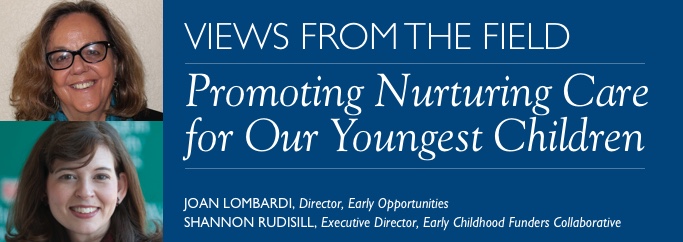
Early childhood matters. Mounting evidence over the last several decades has demonstrated the importance of the early years to long term health, behavior, and learning. In 2018, the Nurturing Care Framework was released at the World Health Assembly, providing a new opportunity to shine a spotlight on the importance of the earliest years of life. Promoting nurturing care is now becoming a global movement.
What is the Nurturing Care Framework?
In 2016, The Lancet published Advancing Early Childhood Development: From Science to Scale, the third in a series on child development which helped define the concept of “nurturing care.” The core components of nurturing care for young children include good health, adequate nutrition, responsive caregiving, safety and security, and early learning. Like the domains of development, these essential elements are indivisible and interrelated, as one impacts the other. Across these components, the Lancet series recognized the importance of providing an enabling environment to ensure that caregivers are supported with the necessary policies and programs to promote nurturing care.
Less than two years later, WHO released Nurturing Care for Early Childhood Development: A Framework for Helping Children Survive and Thrive to Transform Health and Human Potential. This important document, supported by a broad group of stakeholders from around the world, provides a roadmap for action. While early childhood development covers children 0-8, the framework focuses on the period from pregnancy to age 3, where the health sector has a particularly important role. Building on the evidence, the framework:
- outlines why efforts to improve health, well-being, and human capital must begin in the earliest years;
- discusses the major threats to early childhood development and how nurturing care protects young children from the worst effects of adversity and promotes physical, emotional, social and cognitive development; and
- highlights what caregivers need to provide nurturing care for young children, encourages a whole of society approach and describes guiding principles, strategic actions and ways of monitoring progress.
An Important Opportunity for Action
Today in the United States and across the world, the interest in early childhood continues to grow. In the United States there have recently been important increases in federal and state resources for child care; advances in Head Start and Early Head Start; the launch of the Birth to Five Preschool Development Grants; interest in the expansion and use of Medicaid to assure early health and development; and the continuation of the Maternal, Infant, and Early Childhood Home Visiting Program. Along with these public-sector initiatives, there is growing interest from philanthropy and civic leaders at all levels to assure all children get off to a good start with equal opportunities. This is fueled by an acceleration of citizen involvement in communities across the country, including a growing movement of parent voices in the policy process.
These developments, along with the emergence of a vision provided by the nurturing care framework, makes this an opportune moment for grantmakers to increase their efforts to help young children thrive, support families, and transform policies.
Below are five steps to move the agenda forward in states and communities:
-
- Build partnerships across sectors in communities to promote child development outcomes. The philanthropic community has a unique opportunity to bring together leaders across sectors. Health, education, and economic opportunity funders should come together to support whole child, whole family, and whole community approaches. One of the key strategies for cross sector collaboration is to establish a clear set of outcomes that everyone, from pediatricians to preschool teachers to parents, can get behind. Taking a life course approach, early outcomes could include: healthy pregnancies and births, children thriving at three, and eager and ready for success at five, with specific targets for each stage.
- Use the Nurturing Care Framework as the vision for action. The framework provides clear recommendations for services and interventions for each of the five core components. These can serve as a jumping off point for a community interested in developing a plan which would start with mapping current services and gaps, developing specific goals and involving a broad group of stakeholders.
- Promote policies that support families and enable positive parenting. It is not enough to have specific goals for children without focusing on those supports that help parents be successful. The Nurturing Care Framework reflects a multigenerational approach which works to support the health and mental health of parents and works to promote social networks of support, empowerment and sufficient family income. Providing information about child development needs to be coupled with a broader set of supports that can promote family well-being. The United States should be advancing more supportive family policies that have long been established in many of the Organization for Economic Co-operation and Development (OECD) countries.
- Recognize the importance of child care providers and invest in quality. With more and more children spending time in child care and other early childhood settings, those adults providing care become particularly important to both young children and families. Yet the early childhood workforce has not received the recognition and support that is needed to assure quality. New innovations are needed to help improve training, compensation, and working conditions for those who are caring for young children every day.
- Support the infrastructure needed to assure a system of support across programs. Communities across the United States are trying to put a system in place which provides ongoing support across programs and across the early years. This will take new investments in leadership development, data systems, professional development opportunities, and new metrics to monitor progress and make change.
We have entered a new era in the movement to guarantee equality of opportunity and to support the potential of every child. By stepping forward to support new innovations and scaling of services in the early years, the philanthropic community will be helping to promote a more inclusive and prosperous future for all families.
References
The Lancet. Advancing Early Childhood Development: From Science to Scale. Vol. 389, No. 10064. October 2016. https://www.thelancet.com/series/ECD2016.
WHO, UNICEF, World Bank. Nurturing Care for Early Childhood Development: A Framework for Helping Children Survive and Thrive to Transform Health and Human Potential. World Health Organization, 2018. https://www.who.int/maternal_child_adolescent/documents/nurturing-care-early-childhood-development/en/.

